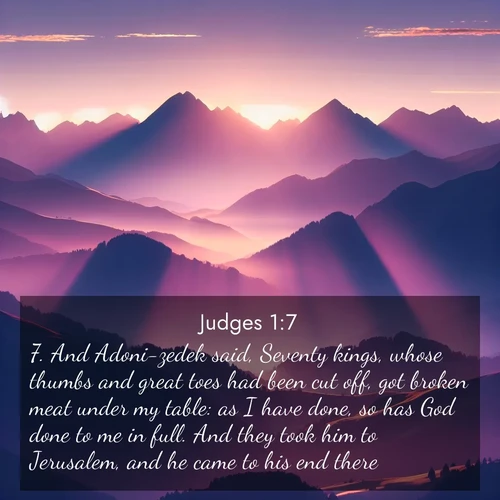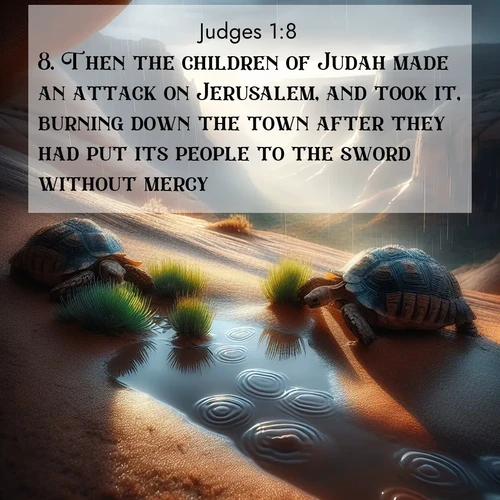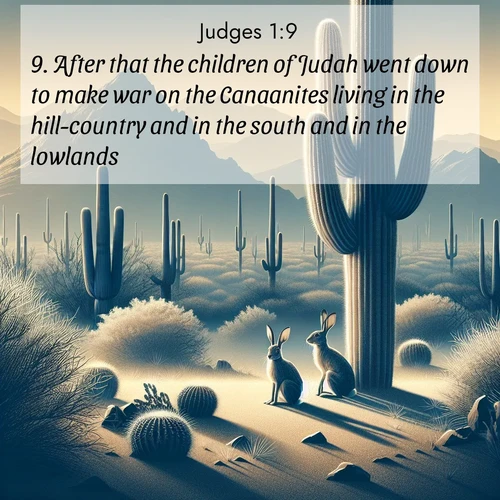Basic English Bible Image Collection: Explore Images for the Theme Judges Chapter 1
Judges 1:1. Now after the death of Joshua, the children of Israel made request to the Lord, saying, Who is to go up first to make war for us against the Canaanites?
Read the verse in its context:
Basic English Judges 1
Judges 1:2. And the Lord said, Judah is to go up: see, I have given the land into his hands.
Read the verse in its context:
Basic English Judges 1
Judges 1:3. Then Judah said to Simeon his brother, Come up with me into my heritage, so that we may make war against the Canaanites; and I will then go with you into your heritage. So Simeon went with him.
Read the verse in its context:
Basic English Judges 1
Judges 1:4. And Judah went up; and the Lord gave the Canaanites and the Perizzites into their hands; and they overcame ten thousand of them in Bezek.
Read the verse in its context:
Basic English Judges 1
Judges 1:5. And they came across Adoni-zedek, and made war on him; and they overcame the Canaanites and the Perizzites.
Read the verse in its context:
Basic English Judges 1
Judges 1:6. But Adoni-zedek went in flight; and they went after him and overtook him, and had his thumbs and his great toes cut off.
Read the verse in its context:
Basic English Judges 1
Judges 1:7. And Adoni-zedek said, Seventy kings, whose thumbs and great toes had been cut off, got broken meat under my table: as I have done, so has God done to me in full. And they took him to Jerusalem, and he came to his end there.
Read the verse in its context:
Basic English Judges 1
Judges 1:8. Then the children of Judah made an attack on Jerusalem, and took it, burning down the town after they had put its people to the sword without mercy.
Read the verse in its context:
Basic English Judges 1
Judges 1:9. After that the children of Judah went down to make war on the Canaanites living in the hill-country and in the south and in the lowlands.
Read the verse in its context:
Basic English Judges 1
Judges 1:10. And Caleb went against the Canaanites of Hebron: (now in earlier times Hebron was named Kiriath-arba:) and he put Sheshai and Ahiman and Talmai to the sword.
Read the verse in its context:
Basic English Judges 1
Judges 1:11. And from there he went up against the people of Debir. (Now the name of Debir in earlier times was Kiriath-sepher.)
Read the verse in its context:
Basic English Judges 1
Judges 1:12. And Caleb said, I will give Achsah, my daughter, as wife to the man who overcomes Kiriath-sepher and takes it.
Read the verse in its context:
Basic English Judges 1
Judges 1:13. And Othniel, the son of Kenaz, Caleb's younger brother, took it; so he gave him his daughter Achsah for his wife.
Read the verse in its context:
Basic English Judges 1
Judges 1:14. Now when she came to him, he put into her mind the idea of requesting a field from her father: and she got down from her ass; and Caleb said to her, What is it?
Read the verse in its context:
Basic English Judges 1
Judges 1:15. And she said to him, Give me a blessing; because you have put me in a dry south-land, now give me springs of water. So Caleb gave her the higher spring and the lower spring.
Read the verse in its context:
Basic English Judges 1
Judges 1:16. Now Hobab the Kenite, Moses' father-in-law, had come up out of the town of palm-trees, with the children of Judah, into the waste land of Arad; and he went and was living among the Amalekites;
Read the verse in its context:
Basic English Judges 1
Judges 1:17. And Judah went with Simeon, his brother, and overcame the Canaanites living in Zephath, and put it under the curse; and he gave the town the name of Hormah.
Read the verse in its context:
Basic English Judges 1
Judges 1:18. Then Judah took Gaza and its limit, and Ashkelon and its limit, and Ekron and its limit.
Read the verse in its context:
Basic English Judges 1
Judges 1:19. And the Lord was with Judah; and he took the hill-country for his heritage; but he was unable to make the people of the valley go out, for they had war-carriages of iron.
Read the verse in its context:
Basic English Judges 1
Judges 1:20. And they gave Hebron to Caleb, as Moses had said; and he took the land of the three sons of Anak, driving them out from there.
Read the verse in its context:
Basic English Judges 1
Judges 1:21. And the children of Judah did not make the Jebusites who were living in Jerusalem go out; the Jebusites are still living with the children of Benjamin in Jerusalem.
Read the verse in its context:
Basic English Judges 1
Judges 1:22. And the family of Joseph went up against Beth-el, and the Lord was with them.
Read the verse in its context:
Basic English Judges 1
Judges 1:23. So they sent men to make a search round Beth-el. (Now the name of the town in earlier times was Luz.)
Read the verse in its context:
Basic English Judges 1
Judges 1:24. And the watchers saw a man coming out of the town, and said to him, If you will make clear to us the way into the town, we will be kind to you.
Read the verse in its context:
Basic English Judges 1
Judges 1:25. So he made clear to them the way into the town, and they put it to the sword; but they let the man and all his family get away safe.
Read the verse in its context:
Basic English Judges 1
Judges 1:26. And he went into the land of the Hittites, building a town there and naming it Luz: which is its name to this day.
Read the verse in its context:
Basic English Judges 1
Judges 1:27. And Manasseh did not take away the land of the people of Beth-shean and its daughter-towns, or of Taanach and its daughter-towns, or of the people of Dor and its daughter-towns, or of the people of Ibleam and its daughter-towns, or of the people of Megiddo and its daughter-towns, driving them out; but the Canaanites would go on living in that land.
Read the verse in its context:
Basic English Judges 1
Judges 1:28. And whenever Israel became strong, they put the Canaanites to forced work, without driving them out completely.
Read the verse in its context:
Basic English Judges 1
Judges 1:29. And Ephraim did not make the Canaanites who were living in Gezer go out; but the Canaanites went on living in Gezer among them.
Read the verse in its context:
Basic English Judges 1
Judges 1:30. Zebulun did not make the people of Kitron or the people of Nahalol go out; but the Canaanites went on living among them and were put to forced work.
Read the verse in its context:
Basic English Judges 1
Judges 1:31. And Asher did not take the land of the people of Acco, or Zidon, or Ahlab, or Achzib, or Helbah, or Aphik, or Rehob, driving them out;
Read the verse in its context:
Basic English Judges 1
Judges 1:32. But the Asherites went on living among the Canaanites, the people of the land, without driving them out.
Read the verse in its context:
Basic English Judges 1
Judges 1:33. Naphtali did not take the land of the people of Beth-shemesh or of Beth-anath, driving them out; but he was living among the Canaanites in the land; however, the people of Beth-shemesh and Beth-anath were put to forced work.
Read the verse in its context:
Basic English Judges 1
Judges 1:34. And the children of Dan were forced into the hill-country by the Amorites, who would not let them come down into the valley;
Read the verse in its context:
Basic English Judges 1
Judges 1:35. For the Amorites would go on living in Mount Heres, in Aijalon, and in Shaalbim; but the children of Joseph became stronger than they, and put them to forced work.
Read the verse in its context:
Basic English Judges 1
Judges 1:36. And the limit of the Edomites went from the slope of Akrabbim from Sela and up.
Read the verse in its context:
Basic English Judges 1
The images of Bible verses are created starting from the verses in the Basic English Bible and are made vailable freely for download and use. A link to our website is appreciated to let others know about this free image library. The Bible in Basic English was created in the 1940s by S.H. Hooke, an English language scholar. He wanted to make the Bible accessible to people with limited English, those learning it as a second language, and those with low literacy. To achieve this, he used a simplified vocabulary of just 850 common words, with minimal grammar. This made the text easier to understand, though some argue it loses some of the poetry and nuance of the original. Despite this, it has been praised for its clarity and continues to be used today by many, particularly in education and evangelism. Lausanne-Renens AB church wishes you a good Bible reading!
NOTE: the images are free to use and share. Please include a link to our site to help others find this resource.




































